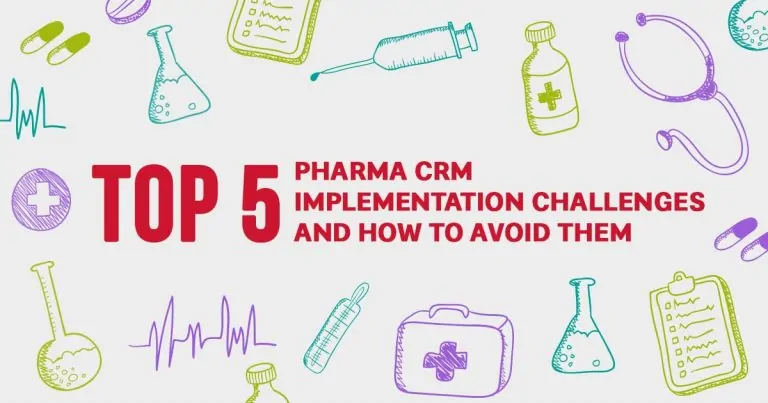
Updated: September 5, 2025
Published: February 9, 2017
When you decide on pharma CRM, one of the first steps of implementation is finding out its most common challenges in order to avoid them. Take a look at our article for CRM implementation challenges and discover the useful details for your project.
Pharma CRM implementation is usually a long and complex process that requires a predefined strategy and roadmap. Most of the companies frequently face some challenges of CRM implementation on their way to digital transformation. CRM for pharmaceutical companies is not an exception. Therefore, we would like to discuss the top 5 pharma CRM implementation challenges.
List of Contents:
- High costs of pharma CRM
- Establishing metrics
- Pharmaceutical CRM integration
- Business processes in pharmaceutical CRM software
- Employees training
- In conclusion
Sophisticated pharma CRM software may become the major competitive advantage for almost any company, no matter on which market they’re oriented. Like FMCG companies, direct interactions with end consumers is not a common practice here. The pharmaceutical business draws on healthcare professionals’ confidence.
Basically, pharma companies and doctors don’t have the standard relations manufacturers and buyers do. Rather, it’s a collaboration between two concerned parties shaped by unique and common business rules. Healthcare professionals are keen to stay up to date about the latest achievements of pharmaceutical manufacturers. At the same time, pharma companies get a chance to promote their new and old products. As such, sales increase.
The conclusion is forced upon you; the pharma CRM strategy differs from the rest of the relationship management systems based on their main goals. The solution that fits for almost any other company does not work for this industry because it is focused on relations with end consumers, while CRM for pharmaceutical companies treats the healthcare professional like partners. The only option available for the company is to carefully evaluate industry-specific solution vendors like Veeva or IQVIA. This brings us to the first one of CRM implementation issues a pharmaceutical company faces on the way to digital transformation completion.
HIGH COSTS OF PHARMA CRM
Introducing and implementation are an extremely expensive and long process, but nothing that well-developed company with long track record can’t handle. Long company history can unexpectedly become an issue when it comes to integrations with all previously used and chaotically implemented legacy tools and systems. More functionality and support are expenditure items that usually pop up after a project’s budget is almost exhausted. For a long-term perspective, pharmaceutical CRM software is aimed at company growth.
Moreover, you have to be prepared for the growth of annual expenses on licenses and support related to increasing numbers of sales reps, territory managers, supervisors, etc.
Custom developed CRM can become the way out of this situation. Some of the biggest pharmaceutical companies are already moving in this direction, while others already have, and for a quite long time, to boot. This approach gives pharmaceutical manufacturers direct control over system maintenance, new functionality introduction, and development, and prevents unexpected bursts of license expenses no matter how much field force they have.
ESTABLISHING METRICS IN PHARMA CRM STRATEGY
Establishing metrics can be a quite tricky task. Accurate and real-time analytics is one of the main reasons why companies take risks related to such budget and time-consuming projects like pharmaceutical CRM implementation. When starting the integration process, companies must pay special attention to the KPIs received during the pilot project. Is received data realistic? The incorrect output could be just as harmful as the correct output. Gathering of all data from the very beginning is a very attractive opportunity that the solution gives to any executive. It is nearly impossible to accomplish. It is better to start focusing on the most obvious and important data like doctor’s engagement during the visits and territory coverage. The gradual introduction of deeper metrics and new functionality will bring more value in the pharmaceutical vendor digital transformation process. Considering the level of pharmaceutical CRM precision, even the generic KPIs received at early stages can change the company’s view on the current situation and market position.
PHARMACEUTICAL CRM INTEGRATION
All pharma CRM vendors offer a wide range of integrations to make the experience smoother for new customers. Unfortunately, the number of legacy applications in use by the pharma companies is even bigger. Outdated databases, complex enterprise IT structures, and old pharmaceutical CRM solutions deployed in the local offices are only some of the challenges for those who want to implement the brand new and powerful system without data losses. There is literally zero chance that all those system APIs and integrations will work how they’re supposed to even if the vendor lists them as completely functional. Internal pharma company IT teams struggle with synchronization almost always, leading to valuable data losses, continuous bug fixing, and failure to meet target delivery dates. Picking up an experienced and reliable IT service provider who will share integration risks with the pharmaceutical company is a great option to make implementation painless from the technical perspective. Speaking long-term, this decision will save your budget, prevent IT infrastructure from failures, and help the pharmaceutical CRM implementation team complete the project in a timely manner. It is hard to imagine a sales rep without iPad or some other tablet. All major pharma CRM vendors already have mobile applications for field force efficiency. Therefore, it is important to start the introduction process with mobile compatibility in mind. We’ll expand on that subject further in the article.
BUSINESS PROCESSES IN PHARMACEUTICAL CRM SOFTWARE
This approach is supposed to make business processes and operations easier instead of adding an extra layer and making employees jump from one window to another while they’re doing routine tasks. Getting started with pharma CRM software implementation it is important to document even the smallest task and create a global repository where all the tasks, roles and workflows will be available for all the stakeholders. Putting all business processes on paper is the key milestone on the way to successful pharma CRM strategy and must be done at the earliest stages. Since global CRM in pharmaceutical industry is often implemented from the HQ to the local offices, teams must make sure that everything is well-documented. Doing so will ensure that there is no chance for the miscommunication that may slow down the process.
At first look, every pharma company uses similar workflow and patterns. In fact, there are lots of details that make every case unique. Vendors are working hard to give clients as much freedom for process customization as possible. However, users often end up with a completely broken business process flow and analytics. Consultancy with a proven track record of eHealth systems implementation can eliminate this challenge.
EMPLOYEES TRAINING
One of the key objectives of any pharmaceutical CRM is optimization and increment of the field force effectiveness. The success of every stage of digital transformation relies heavily on how well employees trained to interact work with a new system and its mobile client. The pharmaceutical companies must make sure that every employee – no matter if he is a sales representative, CRM manager or Territory manager – interacts with a relationship management system in the same way. Taking into consideration the fact that people often are in various regions and speak different languages, making them hold together as a single unit and work the same standardized way may become a serious challenge for the global office. The accuracy of the input data and straight workflow are critical factors for the success of any pharma CRM strategy.
At the same time, it is easy to forget that, even in our digital age, not all people are comfortable using tablets and PCs. Development and setting up a training program for anyone who’ll be working with a new approach is essential, as is a technical realization of the project. Understanding this will prevent a pharmaceutical CRM adoption process from the failure. Of course, there are consulting companies who have the needed expertise to organize that kind of training and make it effective.
Most pharmaceutical companies use this tool and e-Detailing to educate healthcare professionals. According to recent surveys, Fortune 500 companies have gone even further to overcome this challenge by adopting e-Learning models and solutions for education and surveys of their own in-house and outsourced field force. This approach helps to kill two birds with one stone and get around two problems at a time. E-Learning programs educate employees and provide head offices with real-time survey feedback for measuring the level of field force knowledge about a company’s products and services, as well as training reps to work with digital interactive tools simultaneously.
Lots of work must be done during the early stages of the pharma CRM software implementation. Hidden costs, unexpected technical issues, and difficulties with an introduction of the new digital tool to the field force managers are only some of them. The only way to avoid those challenges is to know your enemy and plan three steps ahead. Also, upfront support of experienced IT providers and digital transformation consultancy firms may pave the way for a successful pharmaceutical CRM adoption process.
IN CONCLUSION
In this article, we have covered only some of the frequent challenges faced by pharma companies during its implementation. You’re welcome to contribute to this blog with your remarks and stories in the comment section below. Existek is a custom software development company experienced in custom business intelligence software solutions for a wide range of business verticals including Healthcare. Contact us directly to discuss your pharma CRM software or visit our Custom Software Development Page to learn how we can help you to get a custom solution that will be perfectly adjusted for your business needs.

